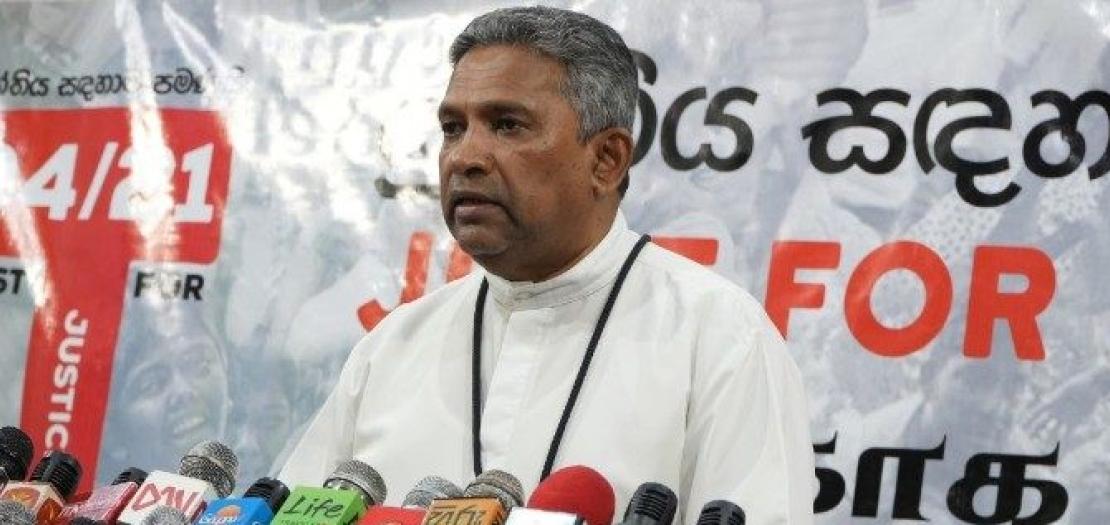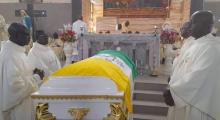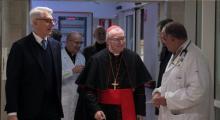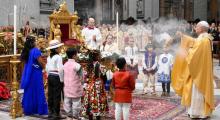Issued by the Catholic Center for Studies and Media - Jordan. Editor-in-chief Fr. Rif'at Bader - موقع أبونا abouna.org

October 21 marks seventy-eight months since the Easter Sunday bombings that tore through Sri Lanka’s Christian community and shook the nation to its core. Nearly seven years on, the Catholic Church continues to call for justice, urging the government to appoint a special prosecutor to oversee what it describes as a long-stalled and politically sensitive investigation.
In an interview with Vatican News, Fr Rohan Silva, OMI, Executive Director of the Centre for Society and Religion (CSR) in Colombo, expressed the Church’s frustration at the slow pace of the inquiry and its determination to keep public attention focused on the need for truth and accountability.
“We have been constantly demanding this appointment,” Fr Silva said, “because the Attorney-General’s Department, which currently handles the case, has not moved with sufficient speed. A special prosecutor would help ensure that charges are filed and justice is not delayed indefinitely.”
A tragedy that scarred a nation
On 21 April 2019, Sri Lanka was hit by a series of coordinated suicide bombings targeting churches and hotels packed with worshippers and holiday guests on Easter Sunday morning. The attacks struck St. Anthony’s Shrine in Colombo, St. Sebastian’s Church in Negombo, and Zion Church in Batticaloa, as well as three luxury hotels in the capital.
More than 260 people were killed, including dozens of children and more than 40 foreign nationals. Hundreds were injured. The blasts were later claimed by a local extremist group inspired by the so-called Islamic State (ISIS).
The attacks were among the deadliest acts of terrorism in South Asia’s recent history and left deep psychological, spiritual, and social wounds that continue to mark Sri Lankan society.
“The victims’ families, the Church, and the whole nation deserve answers,” Fr Silva said. “Justice delayed for so many years is justice denied.”
Hope in a new political climate
A new administration came to power in Sri Lanka a year ago, pledging to reopen investigations that had stalled under previous governments. Fr Silva noted that this change brought “a measure of hope” to a weary public.
“With the new government, we had expectations,” he said. “They promised to revisit the case and to launch fresh investigations into matters that were never properly addressed before.”
Among those matters are revelations aired by the British broadcaster Channel 4, which alleged links between elements of Sri Lanka’s security apparatus and the extremist group responsible for the attacks.
“Those allegations were discussed in Parliament,” Fr Silva explained, “but they were never subjected to formal investigation. We are pleased that inquiries have now begun into some of those issues.”
He said new lines of investigation are focusing not only on the bombings themselves but also on earlier incidents that may have been used to mislead investigators or divert attention away from the real perpetrators.
“It is becoming clearer,” Fr Silva added, “that there may have been attempts to create confusion and to direct suspicion toward the wrong groups, such as the LTTE," even though that movement is not active as a military organization anymore.
The call for a special prosecutor
The Centre for Society and Religion, together with the Archdiocese of Colombo and other civil society organizations, has been pressing for the appointment of an independent special prosecutor dedicated solely to the Easter Sunday case.
“This is one of our principal demands,” Fr Silva said. “We believe that an independent prosecutor would accelerate the process and ensure impartiality, especially since the Attorney-General’s office is also responsible for drafting the indictments.”
He recalled that Cardinal Malcolm Ranjith, Archbishop of Colombo, personally handed a letter to the President reiterating this request.
“It’s not just the CSR,” Fr Silva stressed. “The Catholic Church, lawyers, human rights activists—all of us have been united in this demand. We fear that, without a special prosecutor, interrogations may take place but formal charges will continue to be delayed.”
Each month, on the 21st, the CSR organizes a press conference and a public demonstration, often near one of the churches that was attacked, to remind authorities of their promise to deliver justice.
“We do this to keep the issue alive,” Fr Silva said. “People gather with candles, with photos of their loved ones, and with a simple message: ‘We have not forgotten.’”
Justice and accountability
The Church’s demands have also reached the United Nations Human Rights Council, where the case was raised again in September. While the Sri Lankan government has indicated plans to establish regional special prosecutor offices to expedite various cases, Fr Silva said that is not enough.
“What we are asking for,” he emphasized, “is a special prosecutor exclusively for the Easter Sunday bombings. This is not just another case—it is a national wound that demands transparency and accountability.”
He acknowledged that progress has been slow, particularly where the investigation touches on members of the security and intelligence services.
“That is the most difficult part,” he said. “Some of the same individuals who were responsible for national security in 2019 remain in their positions today. Bringing them under investigation is not easy.”
Keeping up the pressure
Despite the obstacles, Fr Silva said the Church remains hopeful and determined.
“We have not lost hope,” he said. “But hope alone is not enough. There must be sustained pressure—from civil society, from the Church, and from the international community.”
He believes international attention, including from the United Nations and foreign governments, is essential to ensure that the process is not quietly abandoned.
“This government came to power with a promise to deliver justice,” Fr Silva concluded. “They owe it to the victims, to the people of Sri Lanka, and to their own conscience to fulfil that promise. We will continue to remind them—every month, every year—until the truth is known.”






